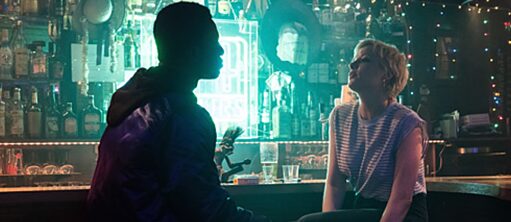Goethe Films: History Now
HISTORY NOW: PAST AS PROLOGUE
GOETHE FILMS are presented by the Goethe-Institut at the TIFF Lightbox
Audiences have seen several adaptations of Alfred Döblin’s classic novel Berlin Alexanderplatz (1927-29) since he wrote the story of Franz Biberkopf and Mieze’s precarious and crumbling Weimar world, between their yearning for betterment and stability and a seemingly inevitable life of crime and prostitution. Fassbinder’s 15-hour epic TV interpretation from 1980 has gone down in film history. At last year’s Berlinale, Burhan Qurbani (We Are Young. We Are Strong.) managed to masterfully reinvent and recontextualise the Berlin Alexanderplatz story of the struggling and disenfranchised “misérables" by transporting us into the middle of the recent refugee crisis and situating his present-day plot in Berlin’s relentless underground economy. Thus Franz from Berlin-Mitte becomes Francis from Guinea-Bissau, tenderly and relentlessly portrayed by newcomer Welket Bungué (who learned German for the role) vis-a-vis the equally soft and fierce Jella Haase as his Mieze.
At this February’s online Berlinale, Dominik Graf had actor Tom Schilling (of Oscar contender Never Look Away and black-and-white drama Oh Boy) run up the Berlin subway stairs today, only to arrive above ground in 1932, tossing the audience back and forth through frantic images evoking the chaotic end times of the first German democracy — and hint at contemporary crossroads. In Graf's Erich Kästner adaptation Fabian: Going to the Dogs, the young journalist-protagonist embodies the increasing desperation of a disillusioned generation running out of options as they are staring at a fascist future. Schilling reunites with Never Look Away co-star Saskia Rosendahl (Babylon Berlin) as his love; Albrecht Schuch (System Crasher; Bad Banks; The Mover), who shines as an uber-villain in Berlin Alexanderplatz, reappears here as Fabian’s vulnerable friend Stephan.
Christian Petzold first stunned audiences with his Berlinale 2018 premiere Transit, moving the 1944 World War II novella by Anna Seghers to a visually modern-day Marseille (where, similarly to the latest Berlin Alexanderplatz, we witness police chases and deportations of African refugees). Against this backdrop, Petzold keeps unfolding the original plot of the frenzied Jewish flight attempts to the Americas through his new luminous dream couple, actors Paula Beer and Franz Rogowski.
The series is contextualized by a video commentary by Tim Cook, Director of Research at the Canadian War Museum. The author of over a dozen books, the historian was awarded the Queen’s Diamond Jubilee medal for his contributions to Canadian history and received the Governor General’s History Award for Popular Media. He is a Director for Canada’s History Society, a fellow of the Royal Society of Canada, and a member of the Order of Canada. Cook’s new book on medicine in the Great War is forthcoming in September 2022.
OCTOBER 7, 6.30PM EST
Canadian premiere!Berlin Alexanderplatz (Germany, Netherlands 2020, 183min), directed by Burhan Qurbani, starring Welket Bungué (filming Cronenberg’s upcoming Crimes of the Future), Albrecht Schuch, Jella Haase, and others. Based on Alfred Döblin's eponymous 1929 novel.
A man from Guinea-Bissau moves to Germany, where he is befriended by a drug dealer and two women.
13 awards including German Film Awards for Best Actor, Best Score, Best Cinematography, Outstanding Feature Film and European Film Award for Best Composer
OCTOBER 12, 6.30PM EST
North American Premiere!
Fabian: Going to the Dogs (Germany 2021, 186min), directed by Dominik Graf, starring Tom Schilling, Saskia Rosendahl, Albrecht Schuch, Meret Becker, and others. Based on Erich Kästner’s 1931 novel Fabian: The Story of a Moralist.
1920s Berlin. Dr. Jakob Fabian, who works by day in advertising for a cigarette company and by night wanders the streets of the city, falls in love with an actress. As her career begins to blossom, prospects for his future begin to wane.
Berlinale 2021 Golden Bear Nominee.
OCTOBER 14, 6.30PM EST
Transit (Germany, France 2018, 101min), directed by Christian Petzold, starring Franz Rogowski, Paula Beer, Matthias Brandt, Maryam Zaree, Barbara Auer and others. Based on Anna Seghers’s eponymous 1944 novel.A man attempting to escape occupied France falls in love with the wife of a dead author whose identity he has assumed.
9 awards including Best Film Dublin International Film Festival and US National Board of Review Top Five Foreign Language Films
TIFF has a safe return to cinema policy in effect including assigned seats, social distancing and masking policies.
Part of the Goethe-Institut focus on German Film
-
10/07
- 10/07/2021 -
10/12
- 10/12/2021 -
10/14
- 10/14/2021

